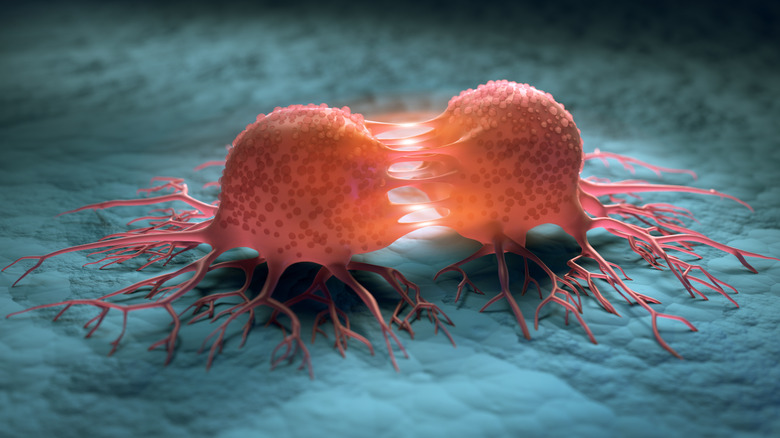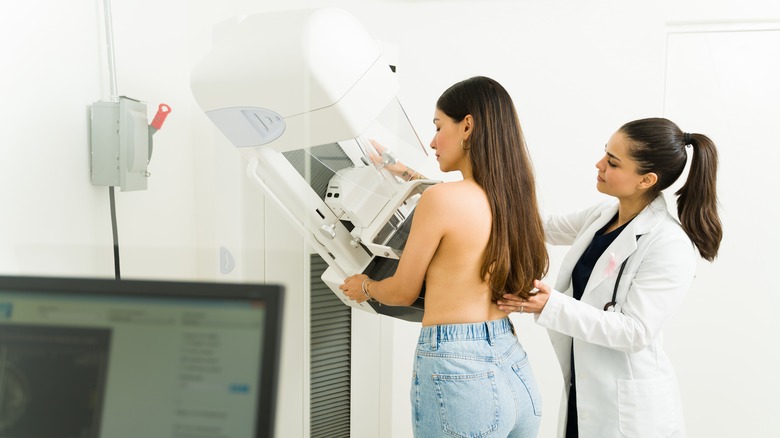What You Need To Know About Inflammatory Breast Cancer
Breast cancer: A diagnosis every woman on the planet dreads. Most are familiar with this cancer, and we know the basic steps we need to take to ensure we spot it before it's too late. Inflammatory breast cancer, however, is much sneakier, and you might not even notice the typical telltale signs that indicate you need to pay an urgent visit to your doctor.
According to the National Cancer Institute, inflammatory breast cancer is rare but incredibly aggressive. Cleveland Clinic reports that this type of breast cancer is most common in North Africa — 11% of breast cancer cases diagnosed in Egypt tend to be inflammatory, while 4% of breast cancer patients in Tunisia have this type of cancer. In the United States, only 1%-5% of people diagnosed with breast cancer actually have inflammatory breast cancer.
Inflammatory breast cancer develops when the cells surrounding the milk ducts in the breasts start to multiply abnormally (this is called invasive ductal carcinomas). They typically end up blocking the lymph vessels, causing inflamed, red, and swollen breasts. Inflammatory breast cancer can progress at an alarming pace — instead of taking a few years, it can spread within months or mere weeks. The cancer causes the breasts to become inflamed, red, and swollen, and by the time doctors diagnose the cancer, it has typically already progressed to stage three or four. While this is scary, we believe that knowledge is power, so read on to discover everything you need to know about inflammatory breast cancer.
What makes inflammatory breast cancer different from other breast cancers?
Adding the word "inflammatory" in front of any type of cancer makes it sound a lot scarier, but what exactly sets inflammatory breast cancer apart from other types of breast cancer?
According to WebMD, the most obvious difference is in how it looks. While ordinary breast cancer usually manifests as a lump in the breast, inflammatory breast cancer causes painful symptoms like swelling and redness with no lump in sight. Healthline adds that your breasts might also feel heavy and hot to the touch. Additionally, the cancer can cause dimpling and discoloration of the skin. Another major difference is that mammograms aren't great at picking up this type of cancer — this is because the cancer cells grow into the skin, making them much harder to spot. It also spreads at breakneck speed as opposed to other types of breast cancers, which means by the time it's diagnosed, it has usually already spread beyond the breasts. Inflammatory breast cancer also affects women at a much younger age than other breast cancers typically do, and it's also more often diagnosed in women who are obese.
Look out for these signs and symptoms
While inflammatory breast cancer doesn't typically manifest as lumps in the breast, there are other telltale signs you can look out for. It is worth noting, however, that many of the symptoms that can indicate inflammatory breast cancer are also often the same symptoms associated with more common conditions that cause inflammation and infection in the breasts. Mastitis is one such condition, and it's pretty common among those who are either pregnant or breastfeeding.
The American Cancer Society notes that any swelling and redness that covers more than a third of your breast is a cause for concern. In addition to that, you might also notice that the nipple of the affected breast starts to retract or become inverted. The breast might also appear bigger and feel heavier. Itchiness and pain are also common. Your breast might also feel hot to the touch, and the skin might start to thicken until it resembles that of an orange peel. You might also notice that the lymph nodes in the area of your collarbone and armpits start to become swollen.
If your doctor prescribes medication to clear up these symptoms and you find no relief within ten days, it's time to go back for another checkup. This is especially important if you deal with these symptoms but aren't breastfeeding or pregnant and have already gone through menopause.
Some people are more at risk of developing inflammatory breast cancer
As you might have already guessed, women are more likely to develop inflammatory breast cancer than men. Doctors have also discovered that black people are a lot more susceptible to this cancer than white people (via Cleveland Clinic).
Contrary to other types of cancer, inflammatory breast cancer is more often diagnosed in people who are quite young — it's commonly seen in people who are 40 or younger, and Mayo Clinic reports that it's often diagnosed in people who are in their 50s as well. The median age at which people are typically diagnosed with this disease is 57. While age, race, and gender play a big role, a person's weight also has an impact on how likely they are to develop this disease. Those who are overweight or obese have been found to be at a higher risk than those who are not overweight.
According to a 2016 study published in Cancer Causes Control, there is a possibility that other factors like smoking, becoming pregnant before the age of 26, and refraining from breastfeeding might also contribute to the development of inflammatory breast cancer, but more research is needed to prove this.
A few things can cause inflammatory breast cancer
According to Healthline, inflammatory breast cancer typically develops due to a malfunction occurring during cell division, damaged DNA, or genetic factors. However, doctors are still trying to figure out what exactly triggers these events, which means the exact cause is still a mystery.
Mayo Clinic explains that the cells which usually undergo a change in DNA, causing a tumor to grow, are often found in the tubes that serve as a pathway for breast milk to travel to the nipple. Tumors can also start to grow in the glandular tissue that is responsible for breast milk production. As these cells start to multiply at an abnormal rate, they eventually start to cause a blockage in the lymphatic vessels. According to Cleveland Clinic, these vessels are responsible for draining lymph fluid from the breast. Once these vessels become blocked by the tumors, it leads to the painful symptoms associated with this condition, like redness, swelling, and dimples in the skin. These cancer cells tend to metastasize (which means they spread from the inside out). This causes the cancer to spread from the lymph vessels to other parts of the body at a frightening pace.
Inflammatory breast cancer can be diagnosed with various tests
According to WebMD, the most common test that's usually ordered to diagnose inflammatory breast cancer is a mammogram. While it can't specifically pick up cancer cells, it can show your doctor if the breast that is presenting symptoms has a higher density than the unaffected breast. Another common test is a breast ultrasound. Using sound waves, this test can present doctors with an image of the inside of your breast, giving them a more detailed picture than a mammogram. This makes it easier to spot changes in the tissue that the mammogram failed to pick up.
Your doctor might order other breast cancer screening tests like an MRI as well. This test uses radio waves and magnets to create a detailed image of the breast's structure, making it easier for your doctor to spot any irregularities. A CT scan is another test typically used to diagnose inflammatory breast cancer and works in the same way as an MRI but instead uses X-rays to create an image of the inside of the breast. Often used alongside a CT scan is a PET scan. This test is helpful for spotting cancer cells, and it will be able to detect them in your lymph nodes and other parts of your body. To confirm your diagnosis, your doctor will take a biopsy of your breast tissue and send it to a lab to test for cancer cells.
Understanding the stages of inflammatory breast cancer
According to Healthline, inflammatory breast cancer is only discovered once it's already reached stage three or four. These stages refer to how far the cancer has spread at the time of the diagnosis.
If you're diagnosed with stage three inflammatory breast cancer, it typically means that some of the affected breast's surrounding tissues have already been infected with cancer cells. This usually includes the skin, the lymph nodes, and the chest wall tissues.
If you're diagnosed with stage four inflammatory breast cancer, it means that the cancer has spread farther than the immediate areas surrounding the breast and can be found in the bones, liver, or the lungs. Medical professionals refer to this condition as metastasis. According to the American Cancer Society, one in every three inflammatory breast cancer patients has metastasized cancer when it's diagnosed. This unfortunately makes it more challenging to treat the cancer successfully.
There are various treatments available
Inflammatory breast cancer can be quite tricky to treat, but the good news is that there are various treatment options available. Breastcancer.org notes that treatment for inflammatory breast cancer is typically more aggressive because it spreads so fast.
Your doctor will likely recommend that you start chemotherapy immediately. If the tumor is HER2-positive, chances are good that your doctor will suggest that you undergo targeted therapy in addition to chemotherapy. This treatment aims to shrink the tumor, which will lead to reduced swelling, making it easier for a surgeon to remove the remaining tumor. As we said, treatment is pretty aggressive. Depending on how the cancer responds to treatment, your doctor might recommend surgery to remove lymph nodes or recommend your breasts be removed entirely. These options are only considered once it appears that the treatment has worked to rid the breast of cancer cells. If this is not the case, your doctor will continue with a different type of chemotherapy or recommend that you undergo radiation therapy. If you get a mastectomy, you might still need to undergo radiation therapy as a means to destroy any lasting cancer cells.
If your inflammatory breast cancer is HER2-positive, your doctor will recommend that you undergo extra targeted therapy after you receive radiation therapy. Hormonal therapy is also an option after receiving initial chemotherapy if your doctor finds that your cancer is hormone receptor-positive.
What is the outlook for people with inflammatory breast cancer?
While it might appear that the outlook for those with inflammatory breast cancer isn't any good, it's not all doom and gloom. Yes, inflammatory breast cancer doesn't have as great an outlook as other types of breast cancer, but that doesn't mean you can't beat it.
According to Cancer Research UK, doctors say that the outlook for this type of breast cancer is starting to improve, thanks to new treatments that are constantly being developed. The American Cancer Society urges people not to focus too much on survival rates when it comes to gauging what the outcome might be for them. While these numbers can help you get a better idea of how successful treatment typically is, it's not set in stone. Every person is different, and you should let your doctor explain these statistics to you rather than trying to figure it out yourself.
You should also keep in mind that various factors will affect your prognosis: the location of the cancer, the size of the tumor, and how much it has spread by the time you are diagnosed will all play a role. Your overall health and age will also have an impact. Then there's also the cancer's reaction to treatment to take into account and whether it has the potential to respond to hormone therapies. According to the National Cancer Institute, new research is constantly being conducted to help doctors diagnose and treat this cancer more effectively.
It's important to go for regular checkups after treatment
Once you're in remission, it's still important that you go for regular checkups — these are not appointments you want to miss since they are crucial to your long-term health. How often you need to go for these checkups differs from person to person, depending on their initial diagnosis, but Cancer Research UK notes that you can expect it to be a regular thing for around five years. Your doctor might also ask you to go for a mammogram once a year to keep tabs on your breast health.
Your doctor or breast care nurse will use these checkups to examine you thoroughly and ask you about any symptoms you might be experiencing. It's also an opportunity for you to ask them questions or tell them about any worrisome symptoms. You can also call your doctor or nurse in between checkups if anything concerning pops up — don't wait and don't be shy to ask questions. They are there to help you. If they are not immediately available, you can also make an appointment with your GP.
While not all hospitals require patients to have these post-treatment checkups, they are important, and if anything is worrying you or you have questions, make an appointment to speak with your breast care nurse or doctor. It's also wise to have a written care plan in case you need to receive treatment again. Speak to your doctor about getting this in place.
How to know when to see a doctor
We can't stress this enough: If you notice that something is up with your body, make an appointment with your doctor. Don't worry about whether or not they will think you're being paranoid — it's your health, and you should take it seriously. Mayo Clinic urges people to speak to their doctor immediately if they experience any worrying symptoms.
If you have symptoms similar to that of inflammatory breast cancer, your doctor might prescribe a course of antibiotics first since it's common for breast infections to cause these symptoms. If your symptoms improve with the use of antibiotics, there is usually nothing to worry about and it means that you were simply dealing with an infection or some type of inflammation. If symptoms persist, however, it's crucial you make another appointment with your doctor. Breatcancer.org suggests you be upfront and ask your doctor straight up to test you for inflammatory breast cancer. At this point, they might suggest you go for a mammogram or do a biopsy to test for cancer cells. Remember, it's always better to go to the doctor and find out that nothing is wrong than to wait until symptoms get a lot worse. The earlier you are diagnosed with inflammatory breast cancer, the better your chances are of having a full recovery.










